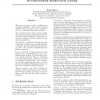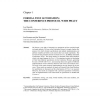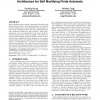242 search results - page 12 / 49 » Using Abstract State Machines at Microsoft: A Case Study |
DATE
2009
IEEE
14 years 2 months ago
2009
IEEE
Abstract—Addressing both standby and active power is a major challenge in developing System-on-Chip designs for batterypowered products. Powering off sections of logic or memorie...
SASO
2009
IEEE
14 years 2 months ago
2009
IEEE
This paper introduces MOCAS (Model Of Components for Adaptive Systems), a generic state-based component model which enables the self-adaptation of software components together wit...
ICML
1996
IEEE
13 years 11 months ago
1996
IEEE
This paper presents a direct reinforcement learning algorithm, called Finite-Element Reinforcement Learning, in the continuous case, i.e. continuous state-space and time. The eval...
PTS
2000
13 years 8 months ago
2000
We discuss a case study of automatic test generation and test execution based on formal methods. The case is the Conference Protocol, a simple, chatbox-like protocol, for which (fo...
CASES
2006
ACM
13 years 11 months ago
2006
ACM
Many embedded systems exhibit temporally and behaviorally disjoint behavior slices. When such behaviors are captured by state machines, the current design flow will capture it as ...



